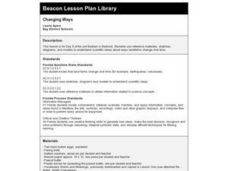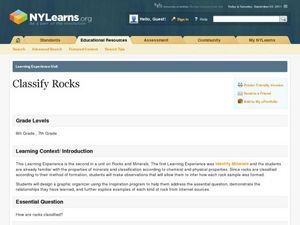Teach Engineering
The Amazing Red Planet
Introduce your class to Mars with a resource that provides information about its size, location, length of day, length of year, number of moons, and average temperature. Also includes is information about the lans for past and future...
Curated OER
Shadow Trackers: From Photography to Writing
Students explore the rotation of the earth. In this science instructional activity, students view photos of various places around the world. Students conduct an experiment in which they can see how the earth's rotation creates shadows on...
Curated OER
Changing Ways
Third graders examine hard boiled eggs as possible models for the earth's layers.
Curated OER
It's Hot
Third graders examine the effect of sunlight on the earth. Individually, they pick an article of clothing out of a bag and sort themselves based on the color of the shirt and whether it should be worn on a cold or a hot day. To end the...
Curated OER
Your Own Greenhouse
Young scholars discuss the similarities between the Earth's atmosphere and a greenhouse. In this science lesson, students make their own greenhouses out of plastic bottles and thermometers. Young scholars record the temperature different...
Curated OER
Mississippi’s Contribution to Space Exploration
Eighth graders engage in a class discussion while going through a PowerPoint on Mississippi's contribution to space exploration. In this Space science lesson plan, the students will also participate in Brain Pop quizzes where they will...
Curated OER
How Far Away is SOHO?
Learners create a scale model of the Earth and the sun that demonstrates where the SOHO satellite is in relation to the Earth.
Curated OER
Global Symposium
Ninth graders work together to develop a sysnopis on the Earth. Using the Internet and print sources, they focus on one country to research and determine its condition. They offer possible solutions to the problem and share their...
Curated OER
Musical Plates
Sixth graders engage in a study of the plates and how they are part of the formation of the ever changing landscape of planet earth. They access web sites that have applications for observation and conducting different activities. The...
Curated OER
How Can a Spacecraft Always Face the Sun?
Students determine the correct orbital path for a satellite that collects data about the sun so that its view of the sun never be obstructed by the Earth.
Curated OER
Reasons for the Seasons
Students discover how the Earth's axis of rotation affects the angle of sunlight and the length of day. They take a survey and give the survey out to family members and friends. They tally their findings and then determine the correct...
Curated OER
Celebrating the Solstice and Equinox
Fourth graders graph the number of daylight hors throughout the year and examine why day length varies. They discover that seasonal changes and latitude on Earth affect the number of hours of daylight in each day. Students listen to...
Curated OER
Shadow Trackers
Students use online websites to inquire about the cycle of day and night. In this web based lesson, students are able to see the movement of the sun and Earth. Students can look at different parts of the Earth as if they were on the Sun...
Curated OER
Making Clouds: Aerosol-Cloud Interactions in a Beaker
Students observe a teacher demo on how clouds form. In this earth science lesson, students discover how cloudiness affects relative humidity. They explain the scattering of light by clouds.
Curated OER
Season's Greetings
Students explore Earth's seasons using an interactive website. In this earth science lesson, students watch video segments and explain Earth's seasonal milestones. They discuss the factors that causes seasonal changes.
Curated OER
The Moon
Young scholars design and build an ideal lunar settlement. In this astronomy lesson, students identify the key features of the moon. They compare its environmental condition with the Earth's.
Curated OER
Why is There a Tidal Bulge Opposite the Moon?
Students simulate how the Moon causes ocean tides. In this earth science lesson, students calculate gravitational acceleration using a mathematical formula. They compare the force of attraction between the Earth, Moon and Sun system.
Curated OER
Classify Rocks
Students classify different types of rocks. For this earth science lesson, students test different rock samples and construct a chart to record observations. They create a concept map that answers essential questions.
Curated OER
Lunar Language
Students use a Lunar Language Graphic Organizer to draw and describe the phases of the moon. They explain patterns of changes in the appearance of the moon as it orbits Earth.
Curated OER
The Tides of Change Worksheet (Part 1)
In this science worksheet, 1st graders track the tides of the ocean for a number of days and examine the data to determine the meaning of the pattern.
Curated OER
Weather Predictions
Students record weather data and create a five day forecast. Students investigate the roles of meteorologists and identify symbols used on a weather map. After gathering weather data for a week, students will create a five day forecast...
Curated OER
Water, Water Everywhere
Students explore water. In this water cycle lesson, students conduct a scientific investigation that requires build a terrarium models of the earth. Students record their observations of the changes regarding water in the terrarium.
Curated OER
Charting Seasonal Changes
Students research the Earth's patterns of rotation and revolution, create a chart and graph of these patterns and use them to explain the causes of night and day and summer and winter.
Other popular searches
- Science Earth Day Activities
- Science Earth Day Lessons
- Earth Day Science
- Earth Day Science Projects
- Earth Day Science Lesson Plans
- Earth Science Earth Day

























